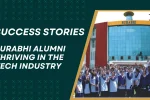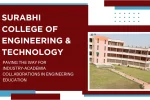Faculty at SCET:Academic excellence doesn’t happen by chance. At Surabhi College of Engineering & Technology (SCET), it’s the result of persistent efforts, expert guidance, and dedicated mentorship—primarily driven by its faculty. SCET in Bhopal has built a reputation not just for its infrastructure or curriculum, but for its people—especially the educators who shape the minds and futures of hundreds of engineering students each year.
The Faculty at SCET are more than just teachers. They are researchers, innovators, mentors, and professionals with real-world experience. Their ability to blend academic rigor with practical exposure transforms ordinary classroom sessions into immersive learning journeys. In this article, we highlight a few outstanding faculty members and explore how their unique approaches contribute to the college’s growing academic standing.
Faculty at SCET
| Faculty Member | Department | Areas of Expertise | Teaching Approach | Key Contributions |
| Dr. Alok Verma | Computer Science & Engg. | AI, Machine Learning, Data Science | Project-based learning, real-world examples | Research in AI, Hackathon mentorship |
| Prof. Shalini Gupta | Civil Engineering | Sustainable Infrastructure, Water Treatment | Field visits, hands-on practicals | Female mentor, eco-building research |
| Dr. R.K. Shukla | Mechanical Engineering | Thermal Engineering, Renewable Energy | Use of simulations, research integration | Industry consultancy, student projects |
Dr. Alok Verma: Tech-Led Teaching with Real-World Insight
Dr. Alok Verma is one of the standout names in SCET’s Computer Science & Engineering department. His specialization in Artificial Intelligence and Machine Learning places him at the forefront of one of the most in-demand fields in engineering today. But it’s not just his research credentials that set him apart—it’s how he connects that knowledge to student learning.
Dr. Verma’s teaching approach focuses on application. He doesn’t just walk students through syntax or code; he dives into logical reasoning, algorithm design, and real-world data problems. His classrooms often resemble innovation labs, where students are encouraged to build actual AI tools or engage in live data analysis. He regularly mentors students for national hackathons and supports them through project design and execution.
His prior experience in software development enriches his lectures with industry scenarios, giving students practical exposure. For aspiring computer engineers, learning from Dr. Verma means gaining both depth in theory and clarity on how it applies in tech-driven industries.
Prof. Shalini Gupta: Sustainability Advocate and Female Role Model
In the traditionally male-dominated world of civil engineering, Prof. Shalini Gupta stands out as a passionate educator and mentor. Her expertise lies in sustainable infrastructure and environmental engineering, areas becoming increasingly critical in modern construction.
Prof. Gupta believes in bringing the outside world into the classroom. Her students don’t just learn through diagrams—they visit construction sites, observe water treatment systems, and analyze environmental data from local sources. This practical engagement helps students connect theoretical knowledge with real applications, a method that makes lessons unforgettable.
As a strong advocate for women in engineering, she plays a key role in encouraging her female students to pursue ambitious careers. Through student-led competitions and eco-building projects, she helps them build confidence and competence. Her publications on wastewater management and green construction show her commitment to research with real-world relevance.
Dr. R.K. Shukla: Engineering Innovation Through Simplified Learning
Dr. R.K. Shukla leads the Mechanical Engineering department with a quiet strength and deep expertise in thermal systems and renewable energy. Known for his calm demeanor and clarity, he’s respected by students for making complex topics approachable and engaging.
His classes often use simulation tools that bring theory to life—whether it’s fluid dynamics or thermodynamic processes. He also promotes mini research projects on topics like solar collectors or heat exchangers, blending academic learning with innovation. His work in process optimization through collaborations with manufacturing units in Bhopal adds further real-world relevance.
Dr. Shukla is deeply involved in mentorship, especially for final-year mechanical engineering students. He not only supports their technical development but also connects them with internships, guiding them toward industry-readiness.
A Culture Rooted in Mentorship and Research
What distinguishes the faculty at SCET is their collective dedication to mentorship. Whether it’s supervising complex final-year projects or helping students apply for national-level competitions, SCET professors are actively engaged in their students’ academic growth.
- Project Guidance: Faculty members invest time in helping students shape capstone projects that tackle real-world problems.
- Industry Linkages: Several professors bring years of professional experience, offering insights into industrial practices and expectations.
- Research Encouragement: Students are frequently involved in research activities, co-authoring papers, or collecting field data under faculty supervision.
This blend of theory, application, and mentorship creates an ecosystem that supports both academic excellence and innovation.
Impact on Student Development
The outcomes of such faculty-driven support are clearly visible. SCET students perform well in hackathons, develop unique final-year projects, and secure placements in reputed companies. More importantly, they leave with a mindset shaped by thoughtful mentorship and exposure to applied engineering.
The faculty’s focus on problem-solving, interdisciplinary learning, and practical exposure ensures that students graduate not just as degree holders but as engineers capable of contributing meaningfully to their industries and communities.
Why Faculty at SCET Stand Out
- Research-Focused: Many are published in national and international journals.
- Industry-Experienced: Real-world knowledge is regularly integrated into lessons.
- Practical Learning Advocates: Labs, field visits, and simulation tools are central to teaching.
- Mentorship Champions: Faculty serve as advisors and role models, offering career and academic guidance.
- Diverse Role Models: Women like Prof. Gupta inspire inclusivity and ambition.
Final Thought
The true measure of a college lies not just in its infrastructure or reputation, but in the hearts and minds of its educators. The faculty at SCET represent a commitment to excellence, empathy, and empowerment. They are the force behind the college’s achievements and the architects of countless student success stories.
If you’re a prospective student looking to join a college where professors do more than just teach—where they mentor, inspire, and walk with you—then SCET Bhopal is worth considering. Share your thoughts below, ask questions about your favorite subjects, or read more about SCET’s departments and student achievements on our blog. Your journey to becoming a skilled, confident engineer could start with the right mentor—just like those at SCET.






